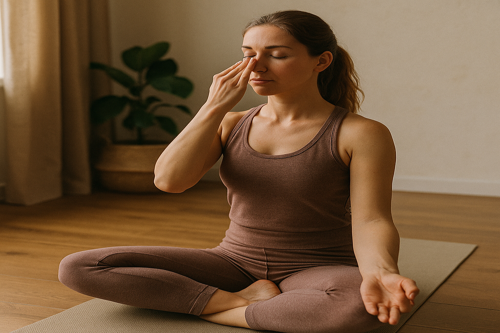Vata Body Type: How Ayurveda Can Help You Feel Grounded, Energized, and Balanced

Introduction to Vata Body Type and Ayurveda’s Approach
So, let's get this straight: if you've ever felt like you're all over the place — a whirlwind of ideas, emotions, energy (and sometimes exhaustion) — you might just have a Vata body type. In Ayurveda, Vata is all about movement. Think: air, wind, lightness, quickness. People with a dominant Vata dosha tend to be creative, talkative, and full of enthusiasm...but also prone to anxiety, dry skin, digestion problems, and a tendency to burn out if they don’t slow down. (Trust me, I’ve been there.)
But why care about Ayurveda's opinion on it?
Because Ayurveda doesn't just slap a label on you and call it a day. It actually gives you tools — lifestyle habits, foods, exercises, even sleep tips — that can make you feel less chaotic and more connected to your body and mind.
When you live according to your Vata constitution, you can feel more grounded, have steady energy throughout the day (imagine that!), and enjoy better digestion, sleep, and even mood. On the flip side, when Vata is out of whack? You're looking at dry everything (hair, skin, nails), crazy sugar cravings, insomnia, and a nervous system that's just screaming for a break.
In this guide, we’ll dive deep into how to take care of your Vata body type — not just with "eat this, not that" lists (yawn) — but through daily rituals, emotional practices, home remedies, and honestly, some pretty comforting food. Plus, I’ll share little insights, observations, and even a few places where Ayurveda made me go, "Wait, really??"
(Short answer: yep. Really.)
Here’s what you’re gonna walk away with:
-
A totally practical, non-dogmatic way to start living more in sync with your nature.
-
Food and lifestyle tips that actually make sense for your real life (even if you’re super busy).
-
A better understanding of how to calm that restless, buzzing Vata energy without killing your sparkle.
Ready? Let’s get into it.

Understanding the Role of Ayurveda in Managing Vata Body Type
What Ayurveda Says About Vata Body Type
Alright, here’s the thing: Ayurveda sees Vata as the "king of the doshas." It's the energy that moves everything — thoughts, blood, waste, nerve impulses. Without Vata, nothing in the body would work. (Kind of a big deal, right?)
Vata's characteristics are:
-
Dry
-
Light
-
Cold
-
Rough
-
Subtle
-
Mobile
Basically, if you feel dry, cold, restless, anxious, or inconsistent, Vata's running the show. It's like your internal "wind" has picked up speed and needs calming down. (Picture tumbleweeds rolling across a dusty desert.)
Now, Ayurveda doesn’t demonize Vata. It’s essential! But the catch? Vata is super sensitive — it’s easily thrown off balance by stress, travel, cold weather, overworking, irregular routines, and even too much screen time.
When Vata’s balanced, you’re creative, lively, adaptable. When it’s not...you might feel scatterbrained, exhausted, and just off.
How Ayurvedic Lifestyle & Diet Directly Impact Vata Body Type
Food, sleep, exercise, relationships — every single part of your lifestyle either balances or aggravates your dosha.
For Vata types:
-
Warm, moist, grounding foods (like stews, cooked veggies, healthy fats) are gold.
-
Rigid fasting, raw salads, and cold smoothies? Not so much.
-
Steady daily routines help calm that wind energy inside you.
-
Skipping meals, erratic sleep, excessive multitasking? Total Vata disasters.
And guess what? It’s not just about what you do. It's how you do it. A rushed yoga session? Not Vata-friendly. A slow, luxurious, deeply felt stretch? 1000x better.
Think: slowing down, moisturizing your life, grounding your energy.
The Importance of Individualized Ayurvedic Approaches for Vata Body Type
One thing I deeply love (and sometimes find frustrating) about Ayurveda?
It always answers: “It depends.”
Meaning — not every Vata type is the same. Maybe you're Vata-Pitta (air+fire) and get angry fast when you're stressed. Maybe you're Vata-Kapha (air+earth) and feel paralyzed into inaction.
Your personal mix — your prakriti (nature) and vikriti (current imbalance) — totally shape what YOU need.
So yes, this guide gives you general Vata guidelines...but real, lasting healing comes from tuning into yourself and maybe even working with an Ayurvedic practitioner who can say, "Hey, your Vata imbalance shows up like THIS, so here's how you can address it."
Ayurveda isn’t "one-size-fits-all." It’s "one-size-fits-YOU."
Ayurvedic Dietary Guidelines for Vata Body Type
Foods Recommended by Ayurveda for Vata Body Type
If you’re Vata, your best friend is anything warm, moist, oily, and grounding.
(Seriously, think of yourself like a delicate little plant that needs rich soil and cozy weather.)
Here’s what Ayurveda recommends loading up on:
-
Cooked vegetables like carrots, beets, sweet potatoes, and squash. (Raw salads? Meh. Maybe once in a blue moon.)
-
Healthy fats: ghee, sesame oil, olive oil, and avocado are your golden ticket.
-
Warm grains like oatmeal, rice, quinoa, and wheat — especially prepared with a little extra butter or ghee.
-
Sweet, juicy fruits — bananas, mangoes, peaches, and cooked apples are ideal.
-
Nuts and seeds, lightly roasted or soaked — almonds, walnuts, pumpkin seeds (but don't go crazy — Vata digestion can be picky).
-
Legumes, but carefully: mung beans and lentils are easier to digest if you spice and cook them properly.
Personal note:
When I started eating mostly cooked foods, my dry skin and chapped lips (hello, winter Vata season!) totally calmed down. It’s a game changer.
Foods Ayurveda Suggests Avoiding for Vata Body Type
On the flip side, Vata types should avoid foods that are cold, dry, rough, and light.
These only crank up the "airiness" that Vata already has too much of.
Try to limit or skip:
-
Raw salads, raw veggies (unless it's super hot outside and you’ve oiled them up!)
-
Crispy snacks like chips and crackers.
-
Cold drinks and foods — ice water, smoothies straight from the fridge, frozen desserts.
-
Caffeinated drinks (they rev up your already speedy mind — trust me, you don’t need it).
-
Dried fruits unless soaked overnight (dates are an exception, they’re super Vata-friendly).
-
Light, airy foods — like popcorn or rice cakes — that don't provide enough grounding substance.
I’ll admit — giving up my daily green smoothie felt like a betrayal of my modern "health girl" identity. But swapping to warm teas and spiced stews? Immediate mood boost.
Meal Planning and Timing Tips in Ayurveda for Vata Body Type
Routine, baby.
Eat three regular meals a day — no skipping, grazing, or chaotic meal times if you can help it.
-
Breakfast should be hearty (like oatmeal with spices and ghee).
-
Lunch — your biggest meal — should be warm, oily, and grounding.
-
Dinner needs to be early (think 6–7 PM) and simple — like a creamy kitchari or veggie soup.
And seriously — sit down, breathe, and focus when you eat. Rushed meals = upset Vata digestion = bloating, gas, feeling "off."
Hydration and Beverage Recommendations for Vata Body Type
For hydration:
-
Warm herbal teas are your besties: ginger, cinnamon, licorice, and chamomile.
-
Avoid cold water — room temperature or warm is best.
-
Bone broths, spiced milks (like turmeric milk), and diluted warm fruit juices (think stewed apple juice) are perfect.
Funny story: I used to think "warm water" was just a weird yoga teacher thing. Then I tried it... and my stomach literally sighed in relief. Sometimes Ayurveda just makes sense.
Ayurvedic Lifestyle Practices Specifically Beneficial for Vata Body Type
Daily Ayurvedic Routines (Dinacharya) to Manage Vata Body Type
Dinacharya is this gorgeous concept of creating stability through daily rhythms.
If you’re Vata, aim for:
-
Waking up around 6–7 AM — not too early, not too late.
-
Self-massage (Abhyanga) with warm sesame oil before showering — it’s like giving your nervous system a giant cozy hug.
-
Gentle movement after waking up — yoga, stretching, or just slow walking.
-
Regular meal times and winding down around 9 PM for sleep.
Life won't be perfect — travel happens, meetings run late — but if you even stick to 70% of this? Huge difference.
Sleep Patterns and Ayurvedic Guidelines Relevant to Vata Body Type
Sleep is critical for Vata folks.
(And if you’re anything like me, insomnia has probably visited a few too many times.)
The Ayurvedic sleep wisdom:
-
Early to bed, early to rise (around 9:30–10 PM max).
-
Create a wind-down routine: warm tea, dim lighting, reading (not scrolling!).
-
Keep your bedroom warm, cozy, and draft-free.
Biggest change I noticed: wearing socks to bed in winter = life-saving hack. Vata types hate cold feet.
Ayurvedic Personal Care Practices for Vata Body Type
Some small but mighty self-care tips:
-
Oil your body daily (really, it’s non-negotiable).
-
Nasya oil drops in the nose to prevent dryness and calm the mind.
-
Tongue scraping and warm water first thing in the morning to stimulate digestion.
And don’t feel guilty about making self-care almost ritualistic — your nervous system needs it.

Yoga & Breathing Techniques for Vata Body Type
Yoga Asanas Specifically Recommended for Vata Body Type
When it comes to yoga, less power, more patience.
Best poses for grounding Vata energy:
-
Child’s Pose (Balasana) — surrender and soften.
-
Seated Forward Fold (Paschimottanasana) — brings energy downward.
-
Warrior I & II (Virabhadrasana) — builds strength and steadiness.
-
Tree Pose (Vrikshasana) — finding balance inside chaos.
-
Legs-up-the-Wall (Viparita Karani) — restores calm, soothes the mind.
Slow, steady flows >>> fast Vinyasa classes. Trust me.
Pranayama (Breathing Exercises) That Improve Vata Body Type
Breathing for Vata should be:
-
Slow
-
Deep
-
Nourishing
Top picks:
-
Nadi Shodhana (Alternate Nostril Breathing) to calm the nervous system.
-
Bhramari (Bee Breath) to soothe anxiety.
-
Ujjayi (Victorious Breath) for focus and presence.
Avoid strong or aggressive breathwork — it can stir up even more "wind."
How Often to Practice Yoga & Breathing Techniques for Vata Body Type
Aim for:
-
Yoga 4–5 times per week (short, grounding practices are better than marathon sessions).
-
Pranayama daily, even just 5 minutes, especially morning and evening.
Fun side note: I once thought I needed hour-long yoga sessions to "count." Ayurveda taught me that 15 mindful minutes can be more powerful than 90 distracted ones.
Stress Management and Emotional Health Advice for Vata Body Type
Ayurvedic Techniques to Reduce Stress Related to Vata Body Type
Stress hits Vata types hard.
(Think racing thoughts, fear spirals, forgetfulness.)
Some Ayurvedic strategies:
-
Warm oil massages — daily if possible.
-
Grounding meditation — focus on the root chakra.
-
Regular meals and bedtime to soothe internal chaos.
When life feels overwhelming, Ayurveda says: Do less. Move slower. Eat warm food. Oil your body. Breathe. Sleep.
It’s basic... and yet radical.
Meditation and Mindfulness Practices Beneficial for Vata Body Type
For Vata types, meditation needs to feel nurturing, not punishing.
Skip the rigid posture rules if you have to. Get cozy.
Simple ideas:
-
Visualization — imagine yourself rooted like a tree.
-
Mantra repetition — simple sounds like “Lam” (root chakra) are super grounding.
-
Body scans with deep breathing.
My favorite? Sitting by a window with a blanket and just watching clouds. Counts as meditation in my book.
Emotional and Psychological Considerations in Ayurveda for Vata Body Type
Emotionally, Vata types are sensitive, creative, and quick to pick up others' vibes.
But they’re also prone to anxiety, insecurity, and overwhelm.
Ayurveda reminds Vata folks:
-
Create emotional routines. (Like calling your mom every Sunday, or doing Sunday night journaling.)
-
Avoid emotional overstimulation. (Too many news headlines? Toxic gossip? Nope, no thanks.)
-
Stay warm inside and out. Emotional coldness — isolation, loneliness — is devastating to Vata energy.
Sometimes, just hearing “you’re not broken, you’re just Vata” can be healing all by itself.
Practical Ayurvedic Home Remedies and Recipes for Vata Body Type
Simple and Effective Home Remedies for Vata Body Type
Sometimes the best healing tools are already in your kitchen (or hidden somewhere between the almond butter and turmeric jar).
Try these:
-
Golden milk before bed (warm milk with turmeric, nutmeg, cardamom) to calm nerves and improve sleep.
-
Warm sesame oil massages (Abhyanga) daily — think of it as armor against dryness and anxiety.
-
Spiced teas: Simmer ginger, cinnamon, and cloves in water — sip throughout the day.
-
Stewed apples with cinnamon for breakfast — gentle on digestion, sweet for the soul.
-
Ashwagandha (under guidance!) if you're feeling frazzled and depleted.
Trust me, your future self will thank you for stocking up on sesame oil and cardamom.
Ayurvedic Recipe Ideas Specifically Beneficial for Vata Body Type
Here’s a mini-menu that would make your Vata energy sigh in relief:
Breakfast:
-
Oatmeal cooked with almond milk, ghee, cardamom, and dates.
Lunch:
-
Root vegetable stew: carrots, sweet potatoes, and beets simmered in coconut milk with cumin and ginger.
Snack:
-
Warm spiced almond milk with a pinch of saffron.
Dinner:
-
Creamy mung bean kitchari with basmati rice and soft cooked veggies.
Honestly, I used to think Ayurveda was super complicated — but it's mostly about cozy, homey foods that feel like a hug.
Preparation Tips and Guidelines for Ayurvedic Remedies for Vata Body Type
Couple quickies:
-
Always favor slow-cooked over quick-fried.
-
Warm everything up — cold leftovers are a no-go unless reheated.
-
Spice everything! Cumin, coriander, fennel, ginger, cardamom, cinnamon — these are your kitchen squad now.

Common Mistakes & Misconceptions About Ayurvedic Lifestyle for Vata Body Type
Common Myths About Ayurveda & Vata Body Type
Some stuff you’ll hear floating around:
-
"Ayurveda says you have to give up coffee forever." (Eh, moderation is key.)
-
"You can’t eat anything raw EVER." (Mostly true, but there’s nuance.)
-
"If you’re Vata, you’re doomed to be anxious." (Nope — balance is very, very possible.)
Ayurveda is flexible, adaptive — not dogmatic.
Typical Mistakes People Make When Adopting Ayurvedic Lifestyle for Vata Body Type
Biggest mistakes I’ve seen (and, um, made myself):
-
Trying to overhaul everything at once — burning out in the process.
-
Following generic advice without personalization — your unique balance matters.
-
Neglecting self-oiling — seriously, daily Abhyanga is not optional for Vata.
It’s not about being perfect. It’s about small, consistent grounding habits.
How to Avoid These Mistakes for Vata Body Type
-
Start small. Add warm breakfasts before overhauling your whole diet.
-
Listen to your body. Ayurveda’s ultimate wisdom is self-awareness.
-
Seek guidance if you feel lost — there are amazing Ayurvedic practitioners out there.
You don’t have to figure it all out alone. (Honestly, Ayurveda is much more fun when shared.)
Real-Life Success Stories & Testimonials Related to Vata Body Type
Inspirational Stories from Individuals Who Improved Vata Body Type Through Ayurvedic Lifestyle
Story 1:
After years of feeling jittery, constipated, and exhausted, Leah finally tried a simple Ayurvedic morning routine — oil massage, warm stewed fruit breakfast, meditation. Within two months, her digestion normalized and she said, “For the first time in years, I feel like my body is on my team.”
Story 2:
James always thought he was just “naturally anxious.” Turns out, after switching to warm foods, consistent sleep, and cutting back on cold smoothies, his brain fog and constant racing mind... slowed way down.
It’s not magic. It’s remembering how to live close to your nature.
Real-world Benefits & Results Achieved Using Ayurvedic Recommendations for Vata Body Type
-
More stable mood (goodbye random bursts of sadness!)
-
Improved digestion (buh-bye gas and bloating)
-
Better sleep (like, actual restful nights)
-
Grounded energy (still creative but way less chaotic)
Scientific Evidence Supporting Ayurvedic Lifestyle & Diet for Vata Body Type
Research Findings About Diet’s Impact on Vata Body Type
While formal studies rarely use "Vata" terminology, modern science increasingly backs key Ayurvedic principles:
-
Warm, cooked foods ease digestion by requiring less metabolic energy (proven by research on gastrointestinal motility).
-
Regular routines reduce stress hormone levels — cortisol spikes are brutal for Vata imbalances.
-
Mindful eating improves gut-brain communication, helping regulate mood and digestion.
Clinical Studies Confirming the Benefits of Ayurvedic Practices for Vata Body Type
Clinical studies have shown:
-
Abhyanga (oil massage) can decrease stress and improve sleep quality.
-
Herbs like Ashwagandha significantly lower anxiety scores compared to placebos.
-
Yoga and Pranayama improve parasympathetic nervous system activity — crucial for calming Vata-driven restlessness.
It’s always so cool when ancient wisdom and modern science shake hands.
Expert Opinions on Ayurvedic Approaches to Vata Body Type
Top Ayurveda experts emphasize:
-
Vata types need warmth, nourishment, and emotional security above all.
-
Lifestyle changes — not just diet tweaks — are what truly balance Vata.
-
Healing Vata isn’t about restriction; it’s about abundance and steadiness.
Conclusion & Summary of Ayurvedic Recommendations for Vata Body Type
In short:
Vata types are incredible.
Creative, spontaneous, full of life — but easily knocked off balance.
Ayurveda offers a beautiful roadmap:
-
Eat warm, moist, grounding foods.
-
Build routines and honor them.
-
Practice slow, gentle movement and breathwork.
-
Protect your nervous system like the precious treasure it is.
Living aligned with your Vata nature doesn’t restrict you — it frees you to thrive.
If you want personalized guidance (and I highly recommend it — Ayurveda loves individual nuance), reach out to an Ayurvedic professional who can tailor everything specifically to you.
Your vitality, calm, and radiance are absolutely within reach.
Frequently Asked Questions (FAQ) about Ayurvedic Lifestyle for Vata Body Type
Q1: Can Vata types eat raw foods sometimes?
Yes, but in moderation. Always balance with oil, spices, and warmth when possible.
Q2: Is fasting good for Vata dosha?
Not usually. Vata thrives on regular nourishment — extended fasting can worsen imbalances.
Q3: What’s the best season for Vata types?
Late summer and fall aggravate Vata; winter (if warm and cozy) can feel stabilizing with proper care.
Q4: Can Vata types drink coffee?
A little bit, occasionally — ideally with lots of milk or spices to soften the impact.
Q5: How long does it take to balance Vata with Ayurveda?
It varies! Some people feel better within a week, others take months — consistency matters more than speed.
References & Credible Sources
-
National Institutes of Health (NIH) -
World Health Organization (WHO) -
Ayurveda Association of America -
Johns Hopkins Medicine
Got any more questions?
Ask Ayurvedic doctor a question and get a consultation online on the problem of your concern in a free or paid mode.
More than 2,000 experienced doctors work and wait for your questions on our site and help users to solve their health problems every day.

